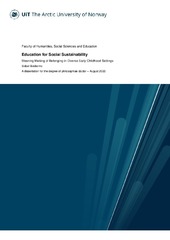Sammendrag
This study examines how early childhood education for social sustainability can be understood through children with migrant backgrounds’ meaning making of belonging in kindergarten. ‘Belonging’ is conceptualised as relationally negotiated and practised, as well as an individual experiential state, and the study’s epistemological and ontological premise is situated within social constructionism and cultural-historical theory. The data material consists of a literature review, and of participatory observations, field notes, photos, and video recordings from field works conducted in two urban multicultural kindergartens. The study’s findings reveal that as early childhood research on social sustainability has conceptualised children as citizens, problem-solvers, and agents of change, the situations for children with migrant backgrounds appear as to be invisible in such a context. Further, the study disclose that even among two-year-old children in diverse early childhood settings, the negotiations of membership and being part are highly influenced by features in the peer culture, symbol systems and hierarchies. Another finding illustrates that semi-institutional environments such as local and global networks outside of the traditional institutions, home and kindergarten, can provide conditions for children’s meaning making of belonging through the use of places and artefacts within the kindergarten. The study put forward that as the premises for socially sustainable societies’ being shaped in early childhood, early childhood education for sustainability should move beyond the narrative of children as agents of change and solvers of problems made by adult generations. The study argues the necessity to take into consideration that future heterogeneous societies demand new understandings of how different ways of meaning making of belonging are ongoing in children’s diverse communities already from their early years on, in order to safeguard inclusive kindergarten practices for sustainable societies to come.
Denne studien undersøker hvordan utdanning for bærekraftig utvikling kan forstås gjennom barn med migrantbakgrunns meningsskaping av tilhørighet i barnehagen. Begrepet ‘tilhørighet’ er konseptualisert både som relasjonelt forhandlet og praktisert, så vel som en individuell opplevelsestilstand. Studiens epistemologiske og ontologiske premiss ligger innenfor sosial konstruksjonisme og kulturhistorisk teori. Datamaterialet består av en litteraturstudie, og av deltakende observasjoner, feltnotater, bilder og videoopptak fra feltarbeid i to urbane flerkulturelle barnehager. Studiens funn avdekker at ettersom forskning på bærekraftig utvikling i barnehage i stor grad har konseptualisert barn som medborgere, problemløsere og endringsagenter, synes situasjonen for barn med migrantbakgrunn å være neglisjert i en slik sammenheng. Videre viser studien at allerede blant to-åringer er forhandlingene om medlemskap og det å være en del av et fellesskap sterkt påvirket av trekk i jevnalderkulturen, symbolsystemer og hierarkier. Et annet funn illustrerer at semi-institusjonelle miljøer som lokale og globale nettverk utenfor hjem og barnehage, kan skape forutsetninger for barns meningsskaping av tilhørighet gjennom bruk av steder og artefakter i barnehagen. Studien fremhever at ettersom premissene for sosialt bærekraftige samfunn formes allerede i tidlig barndom, bør utdanning for bærekraftig utvikling i barnehage bevege seg utover narrativet om barn som endringsagenter og problemløsere. Studien argumenterer for at fremtidens heterogene og mangfoldige samfunn krever en ny forståelse for de ulike former for meningsskaping av tilhørighet som pågår i barns fellesskap allerede fra tidlig barndom av, for å sikre inkluderende barnehagepraksiser og bærekraftige samfunn.
Har del(er)
Paper 1: Boldermo, S. & Ødegaard E.E. (2019). What about the migrant children? The state-of-the-art in research claiming social sustainability. Sustainability, 11(2), 459. Also available in Munin at https://hdl.handle.net/10037/15808.
Paper 2: Boldermo, S. (2019). Practicing Belonging in Kindergarten: Children’s Use of Places and Artifacts. In Garvis, S., Harju-Luukkainen, H., Sheridan, S. & Williams, P. (Eds.), Nordic Families, Children and Early Childhood Education (pp 61-79). Palgrave Macmillan, Cham. (Accepted manuscript version). Also available in Munin at https://hdl.handle.net/10037/15596. Published version available at https://doi.org/10.1007/978-3-030-16866-7_4.
Paper 3: Boldermo, S. (2020). Fleeting moments: Young children’s negotiations of belonging and togetherness. International Journal of Early Years Education, 28(2), 136–150. Also available in Munin at https://hdl.handle.net/10037/19068.


 English
English norsk
norsk
